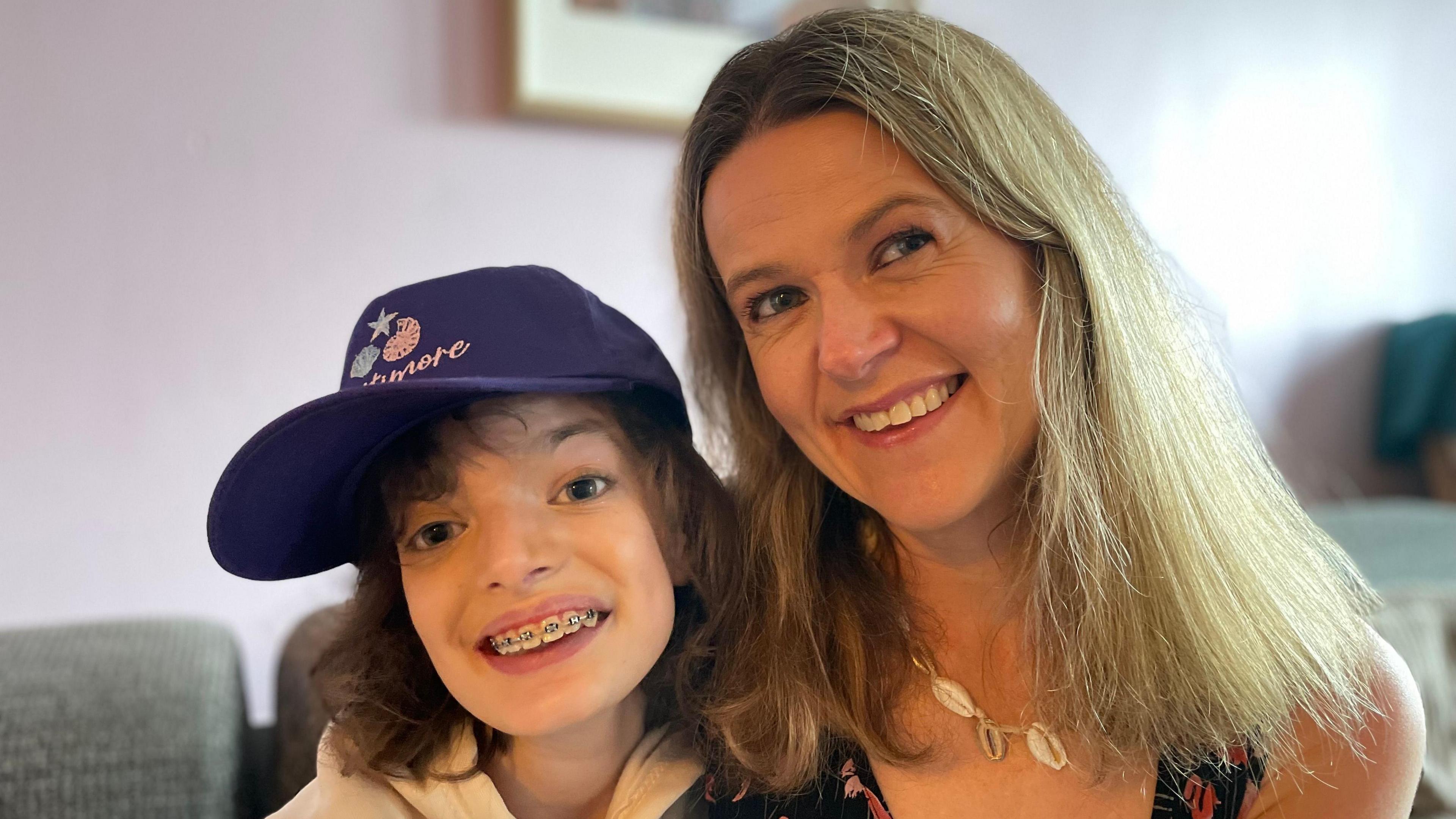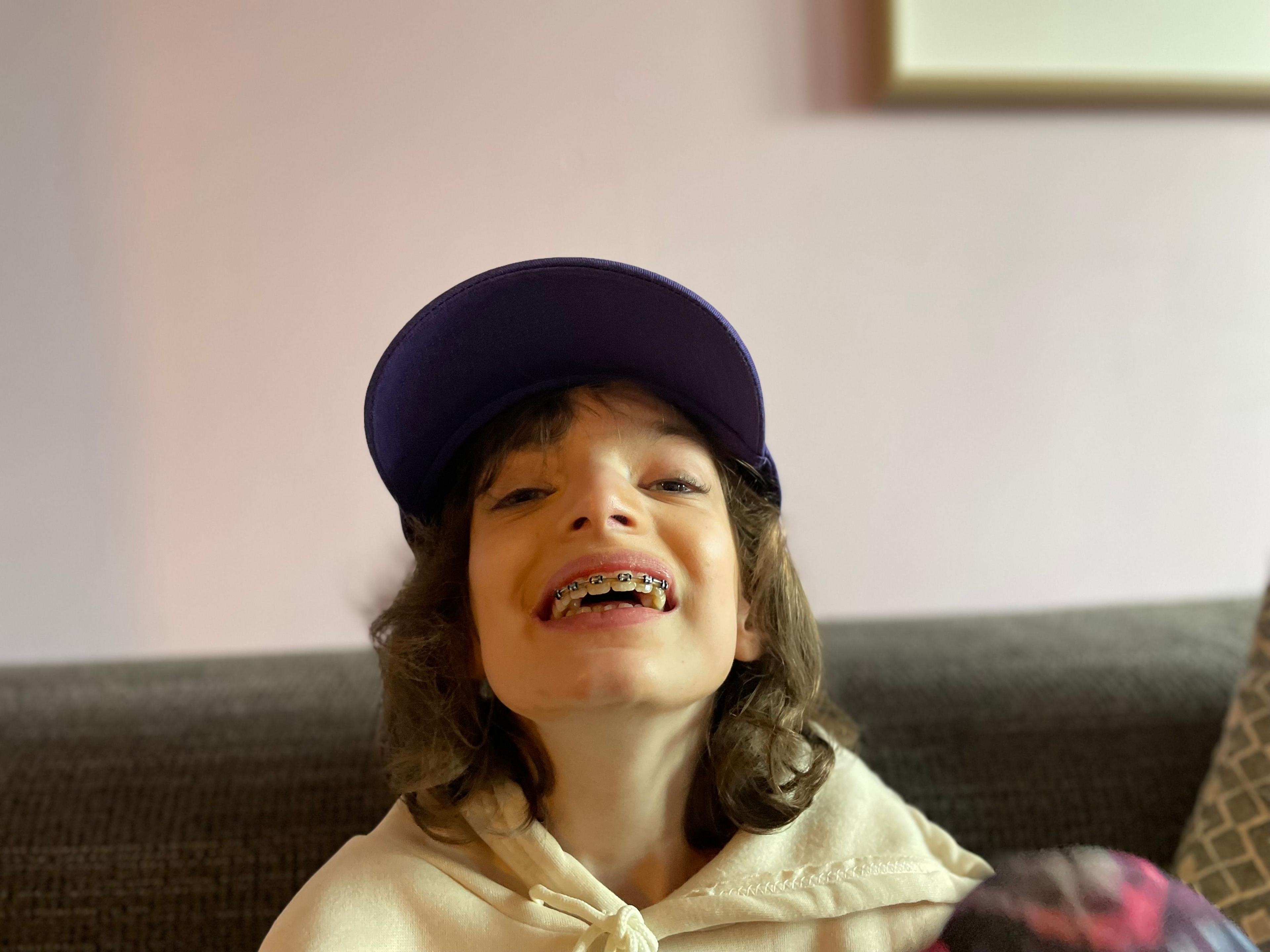No-one knew what Hannah's ASXL3 was - so now we help with research

Hannah and her mum Lesley will take part in a medical conference in Baltimore
- Published
A Scottish schoolgirl with a rare genetic disorder is heading to America to help with research into her condition.
Twelve-year-old Hannah Gould from South Queensferry was diagnosed with ASXL3 at the age of four, and as a result, lives with a range of physical, emotional and learning disabilities.
Hannah and her mum Lesley will attend the world's largest ASXL conference in Baltimore later this month to learn more about the condition, participate in research and celebrate with others who have the disabling disorders.
''I was very sick and I was almost dying a little bit," Hannah told BBC Scotland News about her condition.
Despite her challenges, Hannah has never let it stop her enjoying life.
''I love being special and it's so much fun," she said.
''I like to do some singing, some dancing, some musical theatre.
''My favourite bands are One Direction and Taylor Swift.''

Mum Lesley feels lucky because Hannah has speech ability where others with the condition do not
Mum Lesley said the realisation that something was wrong came early on.
''When Hannah was a very small baby it was very hard to get her to gain weight," she said.
''We were admitted into the hospital and she was very unwell. It was just terrifying.''
She said the first year they spent in hospital almost consistently. Hannah was fed through a tube.
"It was a lot, especially because they were trying to find out what was wrong.
''Nobody knew.''
Lesley said that Hannah was one of about 100 people in the world to be diagnosed with the gene mutation ASXL3 and she did as much research as possible to learn more.
She said: "I tried to read up about it and it can have challenging behaviour, affects sleep, affects her mobility, she doesn't walk steadily or for very long, her speech is delayed.
''She's very lucky because out of a lot of the children with her condition, there's only very few of them that have speech.''
Thousands get diagnosis after 60 new diseases found
- Published13 April 2023
It's time we screened babies for my faulty gene
- Published24 December 2023
Hannah's mum said having a child with an extremely rare genetic condition was hard, because most people know nothing about it.
''You don't really know if what you're doing is correct," she said. "But it's been 100% worth it because she is absolutely fantastic.''
The mother and daughter are both looking forward to finding out more about the condition from experts in the US.
Lesley is keen to find out as much as she can about how it will continue to affect Hannah.
Experts at the Baltimore conference will encourage dialogue between science and medicine specialists across the world and with patients and families.
Dr Emily Woods, of Sheffield University and Sheffield Children's Hospital, who has previously worked with Hannah on research, will present a paper on her one-year study of 50 families with ASXL3 disorders across the world.
Lesley is keen to have Hannah involved in future research studies.
She said: "Anything we can do to help them further their knowledge and understanding of the ASXL3 condition is going to be amazing and getting to know the other families and find out their experiences and challenges as well.''
The conference will include workshops on sufferers' behaviour, and in particular, Lesley and Hannah want help with sleep. A big issue in Hannah's life is her struggle to sleep.
She said: "I have really bad dreams.''

Hannah and her mum are heading to Baltimore for an international conference
Lesley hopes the ASXL conference in Baltimore, external will bring a range of opportunities for patients and families to share experiences and for researchers to share advances.
''I'd like there to be more research into what medicine Hannah could take or what strategies we could use with her to help her with her impulse control," she said.
''I think she'd have more life opportunities if we could get those things under control so I'm not adverse to her taking some medication if there's something out there but at the moment they don't know.''
Hannah has dreams of helping others when she is older: "I want to help sick ladies and sick babies if they have a really bad condition and I am going to be a nurse, a midwife.''
Hannah's been preparing for her trip by watching the movie "Hairspray" and sings
''Good Morning Baltimore''.
She said: "It's going to be amazing".
What is ASXL3?
ASXL3-related disorder, sometimes known as Bainbridge-Ropers syndrome, was first identified as a distinct neurodevelopmental disorder in 2013.
It is characterised by developmental delay or intellectual disability, with speech and language delay and/or absent speech.
Affected individuals may also display autistic features. There may be issues with feeding.
The Sheffield researchers are conducting several long-term studies and hope to improve early diagnosis, and create treatments.
At the moment there is no cure and no treatment but patients and families can be helped to manage symptoms.